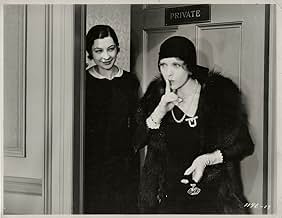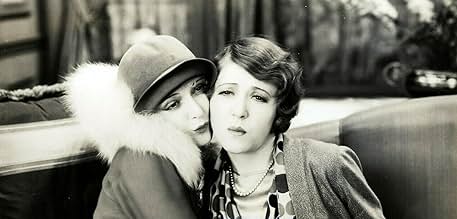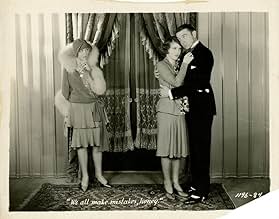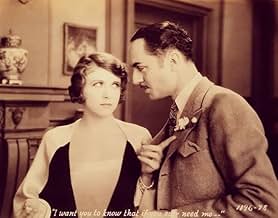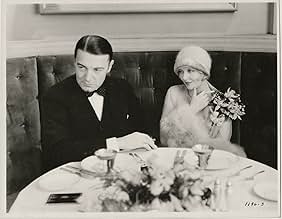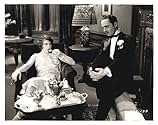Ajouter une intrigue dans votre langueSet in London, Kathryn Miles's marriage is threatened when she discovers her husband's longstanding affair with her best friend but surprises everyone when she uses it to create a new life f... Tout lireSet in London, Kathryn Miles's marriage is threatened when she discovers her husband's longstanding affair with her best friend but surprises everyone when she uses it to create a new life for herself.Set in London, Kathryn Miles's marriage is threatened when she discovers her husband's longstanding affair with her best friend but surprises everyone when she uses it to create a new life for herself.
- Réalisation
- Scénario
- Casting principal
Avis à la une
"Charming Sinners" may be ancient in age (and the sound is often problematic, making some of the dialogue hard to hear) but it's quite modern and sophisticated in its attitudes towards marital infidelity and gender equality. Thematically, it's rather similar to Norma Shearer's "The Divorcee", which it precedes by a year. Not funny enough to be a comedy, and not dramatic enough to be a drama, but it does feature some very good acting - Ruth Chatterton is simply splendid (especially when she smiles), the little-known Mary Nolan is cute, and William Powell has a small, typically suave role. **1/2 out of 4.
... and for good reason! In 1929, the movie camera post dawn of sound was unable to move at all. So Somerset Maugham's play about a philandering husband who wants to have his cake and eat it too was just perfect film material given the limitations of early sound technology. So don't judge this film too harshly.
The philandering husband, Robert Miles (Clive Brook), is having an affair with Anne-Marie Whitley (Mary Nolan), also married. Robert's wife of ten years, Kathryn (Ruth Chatterton), finds out and plans her clever revenge, which, with surgical precision, manages to teach her husband a lesson, give herself a European vacation, and not ruin either her marriage or that of the Whitleys. William Powell plays the suitor that lost out to Robert ten years before and wants another chance, but it's a small part as Powell is not the big star he will be in just a few more years.
I think tragic Mary Nolan as Anne Marie has the most interesting part and she handles it quite skillfully. Anne Marie wants to preserve her marriage, yet she is careless about being seen in public with Robert by people who would have every reason to rat her out. She throws Robert's cigarette case onto her bed and it lands under her husband's pillow. Why??? You could say finances are why she wants to hang on to her marriage, but you can't say the same for her so-called "friendship" with Robert's wife, Kathryn, whom she continually and sincerely calls her best friend even though she is sleeping with her husband. What a puzzling creature she is!
Give it a chance if you ever get the opportunity. The dialogue is very witty since it is the work of a clever playwright, and the acting is quite natural. It is not the stilted stuff of other early talkies where the actors don't seem to know what to do with themselves and the writers are used to writing title cards. Only the lack of motion subtracts from its charm.
The philandering husband, Robert Miles (Clive Brook), is having an affair with Anne-Marie Whitley (Mary Nolan), also married. Robert's wife of ten years, Kathryn (Ruth Chatterton), finds out and plans her clever revenge, which, with surgical precision, manages to teach her husband a lesson, give herself a European vacation, and not ruin either her marriage or that of the Whitleys. William Powell plays the suitor that lost out to Robert ten years before and wants another chance, but it's a small part as Powell is not the big star he will be in just a few more years.
I think tragic Mary Nolan as Anne Marie has the most interesting part and she handles it quite skillfully. Anne Marie wants to preserve her marriage, yet she is careless about being seen in public with Robert by people who would have every reason to rat her out. She throws Robert's cigarette case onto her bed and it lands under her husband's pillow. Why??? You could say finances are why she wants to hang on to her marriage, but you can't say the same for her so-called "friendship" with Robert's wife, Kathryn, whom she continually and sincerely calls her best friend even though she is sleeping with her husband. What a puzzling creature she is!
Give it a chance if you ever get the opportunity. The dialogue is very witty since it is the work of a clever playwright, and the acting is quite natural. It is not the stilted stuff of other early talkies where the actors don't seem to know what to do with themselves and the writers are used to writing title cards. Only the lack of motion subtracts from its charm.
Charming Sinners is the second dialogue film based on the work of England's Somerset Maugham. The film was something new for the cinema. It was not about action. It was about words—expertly delivered by a well-seasoned cast. Clive Brook, Montague Love, and William Powell had been stage veterans since the 1910's. Ruth Chatterton and Laura Hope Crews (who plays her mother) had worked together for years in the Henry Miller Company. Charming Sinners was perfect turf for Chatterton, who dominates the picture and delivers with poignancy and bite.
Chatterton, as the wife of an errant husband (Clive Brook, appropriately stiff and full of himself), opts for the single standard with the sole purpose of getting him back. Enter the polished William Powell, a former beau who is still in love with her. Together, they have much more chemistry. There is an exquisite musical interlude at the piano. While Chatterton plays and sings a wistful melody, Powell pours his heart out. She dismisses his ardor with an appreciative laugh. The question is: will Ruth take a vacation from marriage and rendezvous with Powell in Italy? Although the film ends differently from the stage production, it is an effective, thoughtful finish for an engaging frolic amongst the upper-crust.
Filmed in early 1929, critics were impressed by the film and its players, but complained about the sound quality. It was shot in the wee hours of the morning (typical of early sound features), and it's a marvel that the players pulled off such an amusing piece of work. Robert Milton and Dorothy Arzner co-directed the film. It must be pointed out that the tragic Mary Nolan, the only non-stage veteran (except the Ziegfeld Follies), is excellent as the pampered schemer with whom Brook is smitten. Always thinking and plotting, she turns her distasteful character into something peculiarly fascinating. She proved that some silent stars didn't need to fear the influx of stage veterans with the advent of sound film.
Chatterton, as the wife of an errant husband (Clive Brook, appropriately stiff and full of himself), opts for the single standard with the sole purpose of getting him back. Enter the polished William Powell, a former beau who is still in love with her. Together, they have much more chemistry. There is an exquisite musical interlude at the piano. While Chatterton plays and sings a wistful melody, Powell pours his heart out. She dismisses his ardor with an appreciative laugh. The question is: will Ruth take a vacation from marriage and rendezvous with Powell in Italy? Although the film ends differently from the stage production, it is an effective, thoughtful finish for an engaging frolic amongst the upper-crust.
Filmed in early 1929, critics were impressed by the film and its players, but complained about the sound quality. It was shot in the wee hours of the morning (typical of early sound features), and it's a marvel that the players pulled off such an amusing piece of work. Robert Milton and Dorothy Arzner co-directed the film. It must be pointed out that the tragic Mary Nolan, the only non-stage veteran (except the Ziegfeld Follies), is excellent as the pampered schemer with whom Brook is smitten. Always thinking and plotting, she turns her distasteful character into something peculiarly fascinating. She proved that some silent stars didn't need to fear the influx of stage veterans with the advent of sound film.
Clive Brook is married to Ruth Chatterton. He is carrying on an affair with Mary Nolan. She's married to Montagu Love, as well as being Miss Chatterton's best friend. The adulterers think they've got everyone fooled. But Miss Chatterton knows, and helps cover up for her husband when Love finds out. But she's not done with him.
It's the first sound version of Somerset Maugham's The Constant Wife, and it's played as one of those farces from a couple of decades earlier. Which is what it was. Brook, as usual, plays a stuffy stiff, while Miss Nolan is pretty and affects a French accent for some reason -- possibly to cover up her line readings, which rarely impress me in her talkies. Love is good, and so is William Powell, as a former suitor. But Miss Chatterton is excellent, playing the role as forthright and finding the evolving situation so amusing that she can''t keep a straight face.
As a movie it's not great. Victor Milner's camerawork is struck still, leaving the editing by Verna Willis to carry the burden. Which it doesn't really. Also, the copy I looked at was rather poor in the visuals, and hissy in the audio track. It required a good deal of patience to watch. In the end, though, Miss Chatterton made it worthwhile.
It's the first sound version of Somerset Maugham's The Constant Wife, and it's played as one of those farces from a couple of decades earlier. Which is what it was. Brook, as usual, plays a stuffy stiff, while Miss Nolan is pretty and affects a French accent for some reason -- possibly to cover up her line readings, which rarely impress me in her talkies. Love is good, and so is William Powell, as a former suitor. But Miss Chatterton is excellent, playing the role as forthright and finding the evolving situation so amusing that she can''t keep a straight face.
As a movie it's not great. Victor Milner's camerawork is struck still, leaving the editing by Verna Willis to carry the burden. Which it doesn't really. Also, the copy I looked at was rather poor in the visuals, and hissy in the audio track. It required a good deal of patience to watch. In the end, though, Miss Chatterton made it worthwhile.
Watch it for the clothes and the manners. It is a comedy of manners, and the sets are delicious. Before the Crash...
Hollywood recycles 1926 hit play by Somerset Maugham, THE CONSTANT WIFE. Watch out, these people are still basically Edwardians. Americans "set in London" except Clive Brook, veddy English. An incredibly stiff young William Powell, a serviceable dandy. And Ruth Chatterton in the role of the wronged wife who's wise enough to use guerilla tactics. Laura Hope Crews as her Mother is a fascinating relic of a distant age.
Not for the faint of heart who must see a car explode every 5 minues. The tensions here are emotional and erotic, something Americans have mostly had beaten out of them.
Not for the faint of heart who must see a car explode every 5 minues. The tensions here are emotional and erotic, something Americans have mostly had beaten out of them.
Le saviez-vous
- AnecdotesA nitrate print of this film survives in the UCLA Film and Television Archives.
- ConnexionsReferenced in J'ai été recalé, mais... (1930)
Meilleurs choix
Connectez-vous pour évaluer et suivre la liste de favoris afin de recevoir des recommandations personnalisées
Détails
- Date de sortie
- Pays d’origine
- Langue
- Aussi connu sous le nom de
- Žrtva osvete
- Lieux de tournage
- Société de production
- Voir plus de crédits d'entreprise sur IMDbPro
- Durée
- 1h 6min(66 min)
- Couleur
- Rapport de forme
- 1.20 : 1
Contribuer à cette page
Suggérer une modification ou ajouter du contenu manquant

